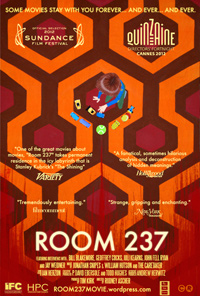Cinema 3.0 is in Full Bloom, and it’s Turned some of us into OCD Madmen
 Stanley Kubrick’s The Shining is firmly canonized as horror film perfection among cinephiles young and old; it’s the place where a traditionally schlocky genre combined with ‘art’ to create some kind of terrifying nirvana in the cinema world. Like every great film predating it, it was exhaustively analyzed, criticized, plagiarized, and analyzed some more by audiences, critics, and cinema theorists everywhere.
Stanley Kubrick’s The Shining is firmly canonized as horror film perfection among cinephiles young and old; it’s the place where a traditionally schlocky genre combined with ‘art’ to create some kind of terrifying nirvana in the cinema world. Like every great film predating it, it was exhaustively analyzed, criticized, plagiarized, and analyzed some more by audiences, critics, and cinema theorists everywhere.
But there’s an interesting thing about when The Shining arrived in cinema history: VHS became a thing just at the end of the 1970’s and was a defining revolution associated with the 80s. For the first time, cinephiles could watch a film whenever they wanted to, without having to wait for a local cinema to screen it or for a TV station to air it. The Shining, having of course been released in 1980, therefore emerged at the dawn of this great shift. As VHS eventually transitioned to DVD, we now find ourselves in the thick of this monumental revolution, thirty years on. The debut feature documentary by Rodney Ascher, Room 237, tackles head-on the absurd, OCD analysis of Kubrick’s seminal horror film that has resulted from this introduction in viewer control.
Focusing on five different cinephiles in a rotisserie-style panel discussion (in which we never see anyone’s face), Ascher structures his doc so that each person takes a turn to give his or her theory on what Kubrick’s film is actually ‘about,’ before then narrowing in on different sub-topics (a chapter on sexuality, another on Room 237 itself, etc). One of them believes there is a trenchant critique of America’s treatment of Native Americans throughout history bluntly injected in background props; another that it’s about the Holocaust; another that it’s a conspiracy exposé on Kubrick’s involvement in faking the Apollo 11 trip to the moon (what words can you make from the keychain tag that reads ‘Room No 237’? Why, ‘Moon Room,’ of course!)
While participants are giving heartfelt, mostly heavily researched cases for their positions, it’s impossible not to view some of this as comedy gold. Whether they’re jumping frame-by-frame through a DVD to show how the vaguest superimposition in a crossfade symbolizes Naziism, or mapping out the entire hotel in a digital graphing software for the sake of showing that Kubrick intended to say that heaven and hell are contained within the Overlook, the obsessive points they make are so endearingly bonkers, so specious and impossible, that you don’t know whether to call them up and listen to them rant for hours, or to go find them and take away their home entertainment system for good.
Which is all to say that this isn’t a film about decoding The Shining and discovering some new insight into the film. It’s a tribute to the personal baggage we bring to cinema and how that influences what we take from a given film, as well as an indictment of the auteur theory, which has resulted in the exaltation of every decision and detail included in any of a beloved filmmakers works (e.g. Stanley Kubrick) to being a brilliant and subliminal masterstroke. Every cinephile has fixated on small stuff and created narratives to our own liking, and it is a surprisingly compelling experience sitting and watching other people do it for us, even if the exercise runs a little too long.
2012 Cannes Film Festival – Director’s Fortnight
104 Mins


